CREATIVE BLOCK: A Relatable Short (With Intimate Interview With Director Nicola Rose)
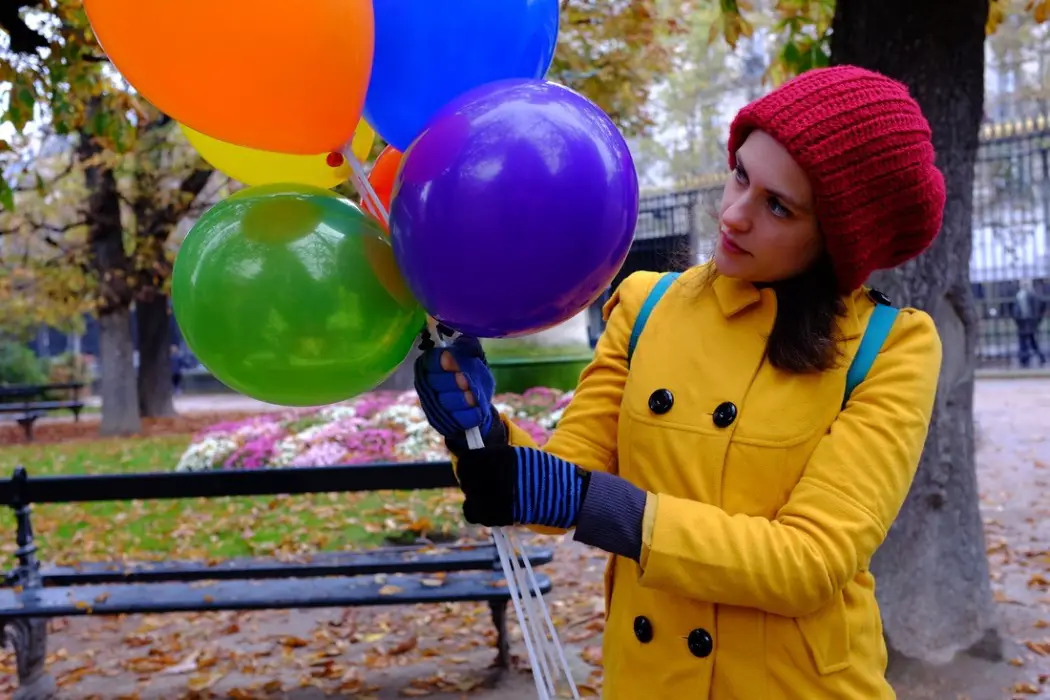
Stephanie Archer is 39 year old film fanatic living in…
Having a mental and creative block is something we can all relate to. At one time or another, we have found ourselves stuck, unable to move forward – whether it be a project, emotional state or art. This kind of block is not limited to artists or situations, and anyone can experience it at any time, in any way. With her new short film Creative Block, director, producer, writer and star Nicola Rose takes a moment to examine the effects of these blocks and the means with which we can break through them.
Premiering at this weekend’s Brooklyn Film Festival, Creative Block is immediately and highly relatable. With its two main characters, each viewer can find themselves in one way, shape or form the experiences, decisions, defeat and success we have all felt at one time or another.
Creative Block
Staring at a block of ice, Claire (Nicola Rose) finds herself lost and unconfident until inspiration finds her in the form of a bunch of balloons outside her window. This spark of hope rises into the blue abyss outside, a window of inspiration opening for her if she wants to let it in. The room around her brightens from a grey, dark loneliness to a room full of bright and exuberant colors. With idea in mind and determination in heart, she embraces the beginning of a new idea.
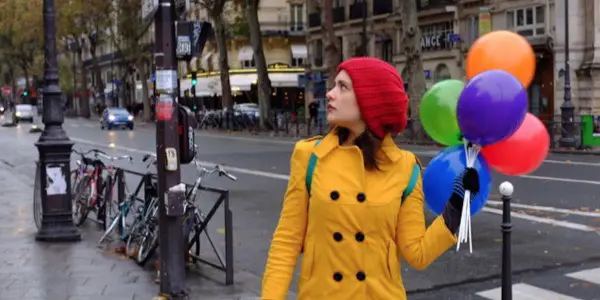
Flash back to sometime earlier, viewers are introduced to the moment Claire’s block began, when the bright colored ideas of the mind were replaced with a black and white void. Struggling to craft a new puppet and advance in her skill, she gives way to her block, finding no inspiration around her. That is, until an enigmatic French skater named Thibaut Baudet (Thomas Vieljeux) becomes the inspiration she so desperately needs.
Yet, as quickly as her inspiration comes it is snuffed out, as the skater is deemed to old for his passion and he resolves himself to the “inevitable” desk job in a bland office with nothing but a regimented future ahead. Seeing the despair he now faces matches her own, Claire travels to France to return color to Thibaut’s life. Yet, what she discovers is that we cannot be given our inspiration, we must make it for ourselves.
No Block Here
At first, you are unsure and lost with regards to what you are watching, much like the character looking for inspiration and freedom from her block. But this is not a short film that makes itself clear from the beginning. Viewers are asked to work through the film with Claire, to discover the meaning of Creative Block as she does.
The use of balloons throughout the film was symbolic. Balloons are a common item handed out no matter the situation – birthday, get wells, congrats. They are always a symbol of joy and well wishes. This was a perfect encapsulation of the inspiration the film is trying to represent, yet a contradiction to the common understanding of balloons. They cannot be handed to you, you must find your own colors and create your own inspiration. However, like the act of handing out balloons, there are those around you that can help facilitate your inspiration – they add to the colors of your life.
Creative Block excelled in the transitions utilized for both motion and action. The mood and mental state of Claire, as well as her level of creativity and inspiration, is represented by the presence and absence of color. When she is lost in an artistic depression, all color is literally drained from the screen. Its instant return to vibrancy occurs with each inspiration she discovers along the way.
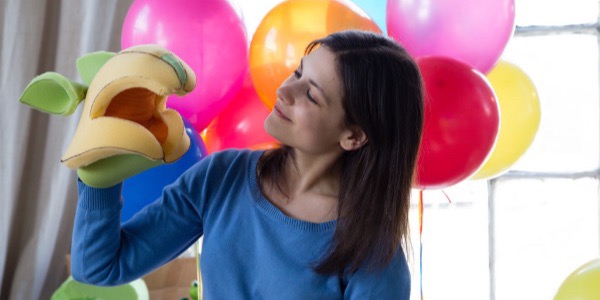
I was impressed with the transition of motion and location as well. Determined to return color to Thibault’s life, Claire boards a NYC subway train, the darkness of the subway tunnels giving way to a transcontinental travel to the subways of France. Not only was the transition fluid and well edited, it was also symbolic in that our passion can transcend all barriers, pushing us farther than we think possible.
I was most impressed with the subtlety of visuals at the end of the film. As Creative Block concludes, Claire is working on a multitude of difference puppets – her balloons behind her. As the conclusion draws even nearer, Claire is shown again, this time as an old woman. Her puppeteering craft has undeniably advanced, and the entire room is swarming with balloons. No words were required to deliver the message to viewers, the visuals perfectly translating that Claire continued to stick with her own colors, making her inspiration and continuing to dream.
Interview
I had the opportunity to interview Creative Block‘s heart and soul, and a true jack of all trades, Nicola Rose. While we initially bonded over familiar area codes and local mall carousels, both originally being from the same area of Connecticut, it quickly became clear what a deep and intimate insight into Creative Block, filmmaking, and this up-and-coming filmmaker I was about to get.
Stephanie Archer for Film Inquiry: So I watched the screener the other day and it was really good. I found it very relatable. Definitely something a lot of people can connect with.
Nicola Rose: I’ve heard that a lot from people. I’m surprised how many people in many different fields, because I thought, well, you know, people are going to relate to it, but it’s probably mostly going to be people in the arts. But I’ve heard from people who were not in the arts at all, either people who were in very different fields and that experienced some sort of lapse with what they did or else just people who had had really bad depression. Sometimes way worse depression than anything I just thought of.
Yeah. Well that makes sense. I mean, only you can really get yourself out of whatever funk or hurdles of your life. So, I mean it was so relatable and definitely reached out.
Nicola Rose: Thank you. I mean, you know, this poor character. She thinks it’s going to be this person who does it and we probably know, most viewers probably know what she doesn’t know ahead of time, which is this is never going to work. I don’t know how old she is. I don’t know anything about what she’s been through, but she just doesn’t know until she figures it out.
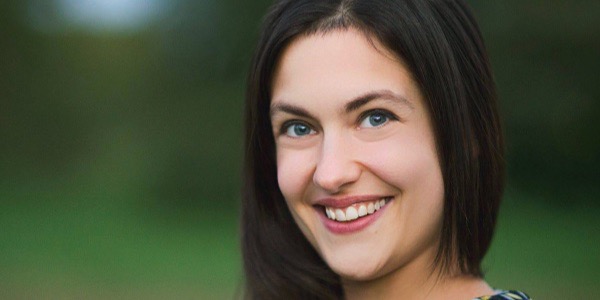
Where did you find the inspiration for creative block?
Nicola Rose: Well, believe it or not, I always say it’s a true story. That’s not exactly true, [laughter] but you know, I didn’t get on the train to the cross the ocean. I was going through in my own life, actually quite a lot earlier in my life, through a very long creative block that led to a depression that really had to do with not knowing what I wanted anymore, after having in earlier years, knowing what I wanted the whole time. It was very specific future I had laid out for myself. I wanted to go to drama school, I wanted to learn theater and then join the Royal Shakespeare Company and play all the Great Shakespearean roles and write and Produce TV – I had all the plans.
That didn’t quite go as planned and I didn’t get into the drama schools that I wanted to and that just kind of sidelined me at the time because I was too young to have any experience too, too young to know this wasn’t really a big deal. At the time it was like, “oh my God, I don’t know how to move forward”. I got into a good college, but I wasn’t really suited for college, which people think is weird. They’re like “oh, you went to Columbia, how could you not be a college person?”. But it is possible. [laughter] You can still be not really a school person, even if you’re good at school. It’s just, you know, a paradox.
Anyways, there was a figure skater. At this point, I wasn’t acting anymore, I wasn’t really doing anything artistic. I was sort of going through the motions, doing my work and getting good grades and not knowing kind of why the hell I was doing anything. And I saw this person perform, this figure skater who was from France who, who actually is the person who does the skating doubling in the film – I put him in as a little cameo. I remember watching him perform and there was something, we don’t see it in the film or anything, but there was something about the way that this particular guy skated and performed – he was always a character and he was always very passionate but also very silly.
And the two of those things together brought back to me when I was in my own sort of gray period, if you want to call it that, everything that I felt I had lost. And I just, as a very young person kind of latched onto this and said “I see myself in this person and what he’s doing that is not necessarily what other people do”. It’s something I recognize and it’s something that I need to take hold of and bring back into my own life because this is really important. And I saw this as somebody who was holding onto his own habit, holding tight to his own colors.
I actually did go to France. Not to meet this person, I went to France for other reasons that are, you know, little more solid on a visa. [laughter] I got my master’s degree in France while I was at the beginning of that period of life. I actually did meet this person. I didn’t storm into his office, but I met him at a skating arena where he was in the audience and I went up to him. He had retired from skating, like the day before, and I said something like – well, actually, I was kind of speaking in tongues. Everything I said was so confused, but he got the gist of it – “I think you’re wonderful and I’m inspired by you, blah, blah blah.”
[laughter]
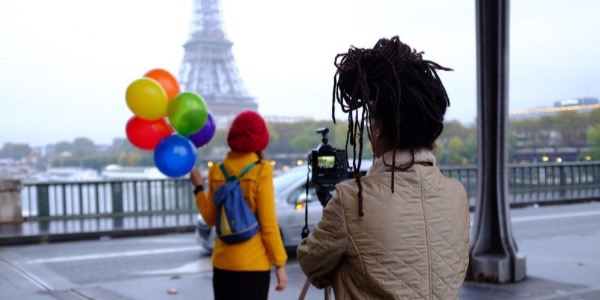
Nicola Rose: We became friends after that because we had some shared interests and he in fact brought up the idea of possibly collaborating on some sort of vaguely defined projects. So you can imagine, I was over the moon about this, so excited. And then when we got into actually talking about it – I was Gung Ho, I was just like, “okay, let’s do this” – he actually took many steps back and was saying, “Whoa, whoa, whoa. I don’t think I need to do this anymore, that part of my life is over. I work in a bank now”. And he did. He worked at a bank, actually not a bank bank, he still works as a portfolio analyst for an asset management company. So it’s like basically doing organization for wealthy people. And he was saying,”I’m not artistic anymore. That chapter’s over. I’m done, I’m done, I’m done”.
Anyway, there was actually a guy who was the head of a federation who has decided it’s not this person’s turn anymore. And the ice skater had been, my take on it, politically pushed to the sidelines, it was somebody else’s turn and it was somebody younger. And he was denying himself at that point and I don’t know that he would agree with me on this, but it’s true. He was basically saying, “I’m not anything anymore. It didn’t matter and it wasn’t that important” and that was pretty much what it took for me to say “I’m not going to do this. I’m not going to say I’m not anything anymore and this isn’t important”. Unfortunately, it was what I needed to be able to get back in the saddle of what I was doing. So a very long explanation for creative fluff.
That’s all right. Hey, it’s the process. It’s what went into it. It’s really interesting knowing that these aspects of the film with the Ice Skater and kind of turning his back on his passion or going for more of the desk job, it really enriches the short film even further.
Nicola Rose: You would think, you know, this couldn’t have happened, this had to have been made up. It’s all very accurate and you even see the skater. I actually got up the courage real late last year to show him the film, which was very difficult because I had sort of said to myself, “if you want to maintain your integrity in this friendship, don’t ever show him that”. [laughter]
[laughter]
Nicola Rose: I have no real self-restraint, so I showed it to him anyway and he was so moved that it was almost heartbreaking. First thing he said was “may I show this to my mom”. I almost cried. I was shaking and obviously said “Yeah, yeah. Show it to whoever, put it all over the Internet and make it ineligible for festivals if you wish”. [laughter] Anyway, his mother loved it, his sister loved it. He’s moved on to a much more stable life I think, than when he was on the ice, but when he was, when he was on the ice, it was just such an unrefined and raw portrait of silly brilliance out there and he never knew it.
What were the creative inspirations that you let in that created the film? Anything in your environment beyond the ice skater that helped create this film?
Nicola Rose: Absolutely. Well, the two films that I think most directly inspired it were The Red Balloon and Amelié. Oh, it was funny because after the fact, somebody pointed out that there was another film that it actually has a great deal in common with which I had seen and I knew and I never once thought of it while making this, which is the Double Life of Veronique, a French/Polish film. Do you know it?
Unfortunately, I do not.
Nicola Rose: That’s okay. I didn’t know it until like 2012, somebody put it in front of me because it has puppets in it, but there’s a great deal of magical realism. The actress actually looks a little like me and there are other things that are similar too, and I certainly wasn’t thinking of all that, but somebody reviewed and said this is really similar to The Double Life of Veronique, even that the actress resembled her. And I looked at it, I was like, holy crap, there’s a lot of. As I say, that movie was very real deep in my conscious. I saw it in Paris, but I forgot it. So, you know, sometimes these things stay in your unconscious. But I think it has been an influence in some small way. Certainly those other two, plus everything by Wes Anderson were specific influences – Moonrise Kingdom is my favorite, actual favorite movie.
There were other things. The music that’s in the film, so about half the music that is in there is by a French composer named Francis Poulenc and he wrote also a piano concerto that doesn’t appear in the movie. That was the piece that actually inspired literally the movie. You know, if you take away the ice skater, you take away everything else, there’s this sort of dominant inspiration which was this piano concerto which is sort of urgent, a little macabre sounding. It’s tense, but it was also very flowing and free. This is the first movement which is like the allegro movements. So, the later movements are different and I love them, but it was the first movement of this piano concerto that I was listening to back in 2013.
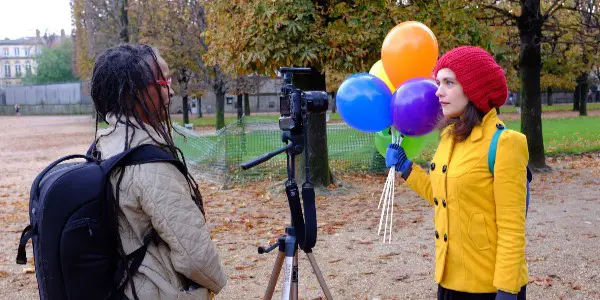
You attended a University in Paris for your masters, did this influence the French language and the location decisions that you incorporated within the film?
Nicola Rose: Yeah, absolutely. There’s nothing that would be in that film if I hadn’t spent that time there. I had lived in Paris before that for just six months, which would be best six months of my life, that was my study abroad program that you do when you’re a junior, and I almost didn’t go, but at the last second I was like, “we’ll do this because I have the opportunity to go to Paris, you know, for very little money”. Thank God I did because everything that matters speaking of the aesthetic and environmental influences. And then my next film actually grew out of that as well, which we’ll have to talk again at some point because that’s a whole other thing.
There are many locations that we were going to use in this film that we actually didn’t use because they were just locations that were personal to me that didn’t actually advance the plot in any way, but we had her wandering by this bookstore and through this garden and all this stuff that I had to sort of look at with an outside eye and flash run the original version by people who were not involved in the film, who didn’t have any emotional attachments – to say, “okay, why is she at that bookstore?” We had cut it down to the bare essentials and it’s still 16-minutes long, which I think is just right to tell this story. I don’t think it could be much shorter, but it was much longer.
Well, I’ve think the timing of your final completed short was nice, compact and flowed very well.
Nicola Rose: I almost think that it feels way shorter than 16-minutes. Not that 16-minutes is long, but it’s long for film festival shorts, and I worried that it was over this arbitrary line that people want and I think it has been a handicap to getting into some festivals. I’ve actually heard “we would have programmed this acceptance…”. I received award from one festival, which seems like a wonderful sense that they gave me an award, but they didn’t program the film. And I was like, “well thank you. I wasn’t mad but why you didn’t program this film”, so they were like, “we loved it, but it’s too long”. It’s like this weird policy. They all say 40 minutes. It’s ridiculous.
16-minutes is not a long film. I was at a festival last week and I saw several films that were like 13 and 15 a piece and my God did they feel long? Not because they were bad, but it’s just a different flow, so 15-minutes could feel like anything. I feel like this film feels like about eight and I’m not complimenting myself. I just feel like goes by real fast.
How has your creativity as a puppeteer influenced your creativity as a filmmaker?
Nicola Rosa: This is going to be kind of a vague answer, but I feel like it actually has to do with colors and shapes, because what I really like about puppets, which you don’t see in the film, is their ability to say whatever they want and get away with it and the fact that they’re kind of separate from humans, the humans who are operating them, and yet they communicate and connect on such a deep level with the humans when they perform. I’ve seen people, both adults and children, unburden themselves to puppets and interact with puppets in a way, an unguarded and free way, that they would never interact with another human – no matter how close. It’s kind of scary. So I love them for their freedom and for their sort of unguardedness. They’re just kind of imperious over whatever’s the truth.
So I love puppets, but honestly in the case of this film, I wanted her to be a puppeteer, not because I trained as a puppeteer, but because I just liked the idea of having all these cool colorful puppets in addition to the color of the balloons throughout her for workspace.
And there was another reason for that, which is that Creative Block was actually a much, much longer and a more realistic script once upon a time – like this 90-page behemoth. They were all these other characters. She went to France, she fell in love, but you met some another guy and she lost her virginity to him and he was a puppeteer and all this other stuff, you know. And so some of it was invested yield from that and then some of it was me saying “puppets are cool”. It made for a fun set. My DP, we have photos of my DP playing with the puppets. So, you know, obviously no one was too tense.
In the film, you can see throughout, that puppeteering, even very subtly, that this is an example of your colors, of your inspiration. Are there any other examples of your colors throughout the film – of you personally?
Nicola Rose: Yeah, there are a couple of little Easter eggs. I mean I’ve told you about my skater and who that was to me and how he was important to me. He’s a friend of mine and he does appear in the film. I just said, “can I use your image for something?”. He’s like go nuts. [laughter]
There are a couple shots in there, all sorts of little Easter eggs throughout the film. Many I took out because they were distracting. I think what remains in there, there’s a Tintin book, which is my favorite comic from Belgium. You blink and you miss it – it’s in there. It’s just in her office – I don’t know why it’s there. Oh! We shot some b-roll with her trying to read the book and she gets so distracted by her own feelings of depression she can’t concentrate on Tintin. Then we cut it out because it was like, you don’t need this.
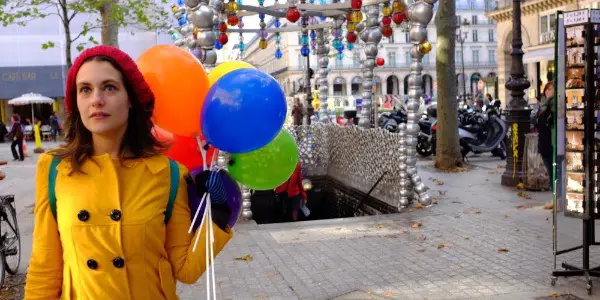
I mean I love balloons, but a lot of people love balloons. Some people are scared of balloons. There was something. What the heck was that? Oh! The two composers whose work you’re hearing literally throughout the film, their pictures are on her wall.
Oh wow. That’s so creative.
Nicola Rose: You know, that that was shot so fast and I think only one person noticed. It’s like, why do you have these old guys on your wall? It was like, funny you should ask. [laughter] Maurice Ravel and Poulenc who in different ways inspire that film. There’s also a huge amount of Easter egging in the music that everytime you hear vocal music, it’s this series of songs by Ravel called Cinq mélodies populaires grecques, five popular Greek melodies. I think they are based on Greek tunes, but basically he turned them very French and I think they are Greek poems translated into French, but he put his own stamp all over them. This was pre-Bolero, it’s early work – nobody knows these things. My mom used to sing them when I was a kid and here’s maybe the biggest Easter egg of all. That is my mother singing and playing on the soundtrack. So I said, “can you sing these things?” She went to Julliard, this is what she does, she’s a singer and she agreed to do it for free, which is amazing. I actually did offer to pay her, but she said no. I paid my sister to do some graphic design. She accepted the money. [laughter]
My whole family’s artists, actually, so it’s very, very easy sometimes to get certain kinds of collaboration, like graphic design or piano. Well, one of the songs is called – I’m going to look up the name of it, but it’s a love song that plays while she’s looking for the first time that she goes skating. The lyrics, which nobody necessarily is thinking about – even if they are French and do understand French. The song is about a girl gathering some sort of plants or flowers. The song has always moved me in particular because what it’s saying is so widely applicable to kind of anything you fall in love with, anyone you fall in love with, but there are some double meanings in it that were specifically, particularly Erie the way they fit into this movie. It wasn’t even anything I was really trying to do. It worked out that way so I can call myself smart.
It’s the song of the girl picking, or gathering, leaves of the mastic tree. I don’t know what the mastic tree is, but it’s something that’s in Greece because you can gather gum from it. The lyrics of the actual song, which are really brief, goes something like, “oh, joy of my soul, joy of my heart treasure, which is so dear to me. Joy, the soul and heart. I love you so ardently. You’re more beautiful than an angel. When you appear angel so sweet before her eyes, like a beautiful blonde angel under the Bright Sun. Alas, all our hearts poor hearts sigh”.
Wow. Oh, I like that.
Nicola Rose: Yeah, I do too. But there’s one thing that happens there which I didn’t anticipate, which is that the line that’s joy and the soul and the heart is “la joie et l’âme et le coeur” and that word – You don’t speak French do you?
No, unfortunately.
Nicola Rosa: That’s fine. It’s not that useful unless you’re doing what I’m doing. That word “l’âme” is l’, which is the article. So l’âme as a word without an article like lâme, instead of l’ – article – âme, lâme as a word means blade, the blade on the ice. So I didn’t mean to do that, but at the moment it’s playing he’s skating around, so it can be interpreted, if you’re thinking about the words, it can be either joy’s soul in the heart or a blade and the heart. I love that. That happens. And you know, like nobody’s ever going to notice that. It’s the one moment in the movie that makes me so happy.
No, unless you had told me, I would’ve never known that. That is really cool. Similar to the skater and so we’ve come full circle with the love of the blade, I’m sure you’ve seen others lose their fight and creative drive for their passion. How has this shaped your own view and drive, especially with pushing through to get this film completed?
Nicola Rose: Yeah, you know, it’s never the easiest thing. Creative Block was a remarkably easy film to make, I now realize after having made a one and a half more. But there are simply moments that you do want to give up at each time, whether it’s personal differences with collaborators, which didn’t really happen with Creative Block, but it does with others or whether it’s variations and mood that bring you down. Something else happens that you can’t control – somebody in your family gets sick, you know.
I think what I always have to come back to is this, it sounds kind of fluffy, but this is where I live is making these things and if I’m not making these things, films or whatever else it might turn into, although I think it’s going to be films, if I’m not making these things, there’s really no point in my working so hard, I mean working four other little jobs to keep this going. And really I’m at my best when I can be making a film and I just have to remember that that’s where my center is. Don’t lose your center. And that’s really what Creative Block was about. So it was a good first short film. It wasn’t my first short film, I made a web series, but it was a good initial film to make because it reminds me of what’s actually most important, which is holding on and not letting other things distract you because you can’t lose. You can’t afford to lose track of who you are.
I was talking to my boyfriend about this and he comes from an extremely different world in the sense that he’s a doctor. He’s always going to be a doctor pretty much. He’s creative and he is artistic, but those are not dominating factors in his life by any stretch. He happens to be very good at some of those things. But he mostly is sympathetic to them and he’s become increasingly sympathetic to them and he’s also, I would say, become aware of them as a way of life, on a personal level since he met me. I think on some level it was a learning curve because you know you’re a doctor, you grow up around doctors who grew up around people with real jobs. This was weird to you. It’s going to be weird to you. That’s not a bad thing. It’s just almost like a culture clash, you know?
But one of the things that he was saying recently because I wound up in one of the bureaucratic struggles that I often end up in, in my work, in this case, it had to do with production insurance and that’s fair enough – so boring – production insurance. And I was saying to him, because this wasn’t me being dramatic, this was literally the process of calling a million people and just trying to get this thing ironed out – this is what it has brought me to. And I’m basically saying there’s no point in me doing this anymore, and it takes a lot to get me to that point but it was what I was saying. And he was basically the one who said, and this is so unlike him because he’s a very moderate, tempered sort of person, “F this shit, you’re a filmmaker, you go out and do what it takes even if it’s breaking the rules!” [laughter]
[laughter]
Nicola Rose: And I was just so, you know, it made me love him even more obviously, but it was also a reminder to me from the outside, this is not just important to me, this is important globally, to keep doing things that you’re called upon to do. I would say we’re wired to do certain things. I take dogs as an example because dogs are really important to me. It’s like you see a border collie and their bred to herd, they want to herd, they really want to go find sheep. And this is my version of finding sheep to her, is making these films. I get work done and then a couple days later I’m like, okay, now that I’ve woken up from my 24-hour nap, it’s time to go find more sheep. [laughter]
[laughter] Speaking of sheep, do you have any future projects on the horizon that we should be keeping our eyes out for?
Nicola Rose: Yeah, Creative Block is the one that is right now in festivals, so that’s why it’s one we’re talking about because it’s the most relevant. But I did finish a film which is now in post-production, so finish is a relative term, but my film In the Land of Moon Stones, which is a much longer film. It’s not really a feature, it’s like a weird no man’s land between being – somebody called it a featurette I guess we go with that. [laughter] That’s going to be coming out later this year, at the end of the year.
That’s awesome!
Nicola Rose: I’m so excited for it because it was so much harder than Creative Block, not just because of its length, but because it’s just additional difficulty and in many respects, I don’t want to say it taught me everything I needed because I’ll find out that’s not true on the next film, it taught me so much about being a filmmaker and you know, things that I did well, like casting and directing, but also things I didn’t do well, like not pre-planning quite enough, even though I thought I had.
And other aspects of production spending more money when I can skimp when I can skip here, that sometimes you go want that extra AC that day, whatever. Spending money on people about stuff.
Film Inquiry thanks Nicola Rose for speaking with us!
Does content like this matter to you?
Become a Member and support film journalism. Unlock access to all of Film Inquiry`s great articles. Join a community of like-minded readers who are passionate about cinema - get access to our private members Network, give back to independent filmmakers, and more.













